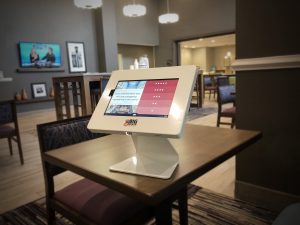Last updated 02-06-2020
By:
Natalya Bucuy
How important is hotel employee job satisfaction?
Well, here’s a story.
Reddit user Skiie has had it with the hospitality industry.
Here’s an excerpt of a post from this former hotel employee:
“I started off as a night auditor in an extended stay hotel with 131 rooms. […] Due to the nature of the hotel I would be checking in 50 people all by myself, then taking care of them the next night, then checking out 131 people. Literally no sleep, no life, barely enough time to even eat much less take care of myself.”
The story goes on to tell a tale of changing jobs, uncaring managers, and just complete unfulfillment in the workplace.
“This post is to reach out to the front desk agent who is continually shafted due to management scheduling them 9 days in a row. This post is for the front desk agent that has been turned down for the second time in a row for front desk supervisor position only to have that position taken by a ridiculously inept outsider who knows nothing about the system….”
Skiie then urges the readers who work in the hospitality industry to look for work elsewhere, as he or she did:
“Go home and start applying for other jobs, 20-30 applications a week.[…] Take the skills you have learned from the hotel and really re-work your resume and find a place that will treat you like a human being. You deserve weekends, holidays and hell you even deserve the occasional day off. You deserve the PTO you’ve been acquiring and you deserve to wake up without thinking about the anxiety that has built up from the night before when you left.”
Now, that’s one unhappy employee. With an attitude like that, it’s hard to imagine that this hotel staff member is fully engaged in the work environment.

Hotel employee job satisfaction directly affects guest satisfaction.
Employees are the backbone of any company and their work can give a company a really great way to start a business and achieve its goals. But, if the employees are unhappy, it really affects the business. 85% of employees are not engaged in the workplace. 81% of employees could leave their job today. Companies with a highly engaged workforce are 21% more profitable (Adeel Shabir, Centriq)
Happy employees lead to happy customers.
It is, therefore, essential for employers to monitor the hotel employee job satisfaction. But how can they do that efficiently?
Here are three steps.
Step 1: Ask employees about their job satisfaction.
One of the most common mistakes managers in all industries make is assume. Candace Yaeger MBA MA, an executive coach specializing in career development, says that every industry, every property, and every department has its own challenges. Therefore assuming a manager knows what makes or breaks his or her hotel employee job satisfaction is a blunder.
But what are the most efficient ways to get this valuable information from employees? The “how, when, and what” to ask can guide the process.
How to ask.
One of the most important qualities of successful feedback collection is anonymity, Yaeger says. Having a feedback platform that allows employees to remain anonymous will ensure honesty without the fear of negative consequences.
A platform like feedback kiosks could easily serve as a perfect on-site feedback solution for employee data.
If performing a face-to-face feedback interview, it’s important to follow the 80/20 rule – listen 80% of the time, and talk for only 20%. “Let the employee know that you’re focused on them,” Yaeger says. “Managers are used to managing and being in the driver’s seat. Give the employees an opportunity to be in charge.”
When to ask.
Timing is important. To get accurate feedback, or to get any feedback at all, it’s important to ask at the right time. Yaeger said making the feedback process convenient for the employees will ensure that they actually participate.
“It should be done during normal working hours,” she says.
The frequency of feedback collection is also important. Asking for feedback often will give the management a better picture of what is going on. What was true last week doesn’t necessarily have to be true this week.
Yaeger also recommends posing questions in a way that references a specific period of time.
For example, asking “In the last six months how often did you experience xyz?” as opposed to “How often do you experience xyz?” is more effective.
“Asking the question that way takes the employees back out of their current mind frame, which might not objectively reflect their overall experiences,” Yaeger said. “Mentally stepping back provides a better assessment, more answers, and better answers.”
What to ask.
The main point of feedback is to find out pain points. The questions management asks its employees should be worded in a way that brings out the most valuable answers.
Yaeger lists some tips on how to pose these questions:
- Make the employee feel valued, heard, and in control. Be patient and be present. Ex.: “If you were in charge…?” “If you were in management’s position…?” “If you could change one thing….?”
- Ask open-ended questions and provide variations of questions. Ex: “What would you do if…?” “How would you change….?”
- Ask about people, not just the systems in place. “Employees don’t quit jobs, they quit bosses,” Yaeger says. “Ask them about the team, ask them about management, and co-workers.” Ex: “How would you rate your team collaboration efforts?”
- Ask follow-up questions. Following a survey or questionnaire, ask for an opportunity to follow up on some of the answers. Ex: “Would =it be ok to contact you with follow up questions based on your answers?”
- Have a like 1-10 scale to rate specifics. Ex: “How likely xyz is to affect your job satisfaction? 1 – not likely at all, 10 – most likely.”
Scott Samuels, the CEO of Horizon Hospitality stresses the importance of respect and empowerment. He recommends asking the following questions to learn more about hotel employee job satisfaction.
- Does senior leadership treat employees with the respect they deserve?
- Does senior leadership empower (hourly) employees to solve basic guest-related issues or do they require management approval?
- Is the hotel’s senior leadership commonly present during peak times and when the hotel is the busiest and do they actively engage with guests during these times?

Step 2: Determine what increases hotel employee job satisfaction.
Asking for employee feedback will give the management a good idea about how the employees feel about their work environment. However, it will not reveal the full picture as the answers will only be as insightful as the questions.
To ensure the best environment and job satisfaction in the workplace, hoteliers need to combine what they learn from the feedback process with general tactics known to improve hotel employee job satisfaction.
Here’s some advice from the experts:
Adeel Shabir, Content Marketing Executive at Centriq:
- Make sure you are available as a manager to cope with the emotional stress of the employees. This will not enable you as a great manager but also the employees will think that they are in a great environment.
- Recognize the employee incentives and rewards to give to the employees. Set a goal and target to get the employees to achieve and upon achieving make sure to give monetary incentives or gift cards.
- Promote good health. Give employees the health insurance that they need and make them consider reading the company’s policies. This way they will know the rules and regulations of the company and know where they are inside the company.
Denise Maiatico, a hotelier and author of “Hospitality and the Holy Spirit.”
- Some things all associates desire: a fair wage and compensation package, the tools and training to deliver great performance, to be part of a winning team, a supervisor or manager who cares, listens and provides lots of feedback, friends, and fun as part of their work experience.
- The key to really great performance comes from building heart-connections and the desire to understand associates at an individual level; discover each of our unique motivations and the “why” we work behind the “what” we have to accomplish. Individuals are complicated and need to be uniquely celebrated. Only when we understand this and strive to treat our associates as unique and celebrated individuals, can we expect to transfer that expectation to the experience of our guests.
The greatest satisfaction I have had in my career hasn’t come from guest comments, or profit and loss statements with positive earnings, but from associates who have truly engaged in our culture, embraced empowerment, made mistakes, learned from them, and gone on to grow into leaders of their own property teams- That’s when I know I have done a great job.
Dr. Jim Houran, Managing Director of AETHOS Consulting Group
- We find that when it comes to full-time employees who are career-oriented there are (i) conditions of satisfaction and (ii) conditions of fulfillment. Different motivational factors drive each of these.
- The happiness question most overtly relates to “conditions of satisfaction” or those variables that enable employees to feel job security. It’s all about securing economic (and hence emotional) stability for themselves and their families.
- However, employees strongly concerned with their career trajectories seek much more than a simple sense of job security. More important than this, is a sense of professional or personal fulfillment – that they are competent, drive value, and contribute meaningfully to a company mission or vision.
- Here, it’s all about securing intellectual stimulation or challenge for themselves and accordingly delivering on their deep-seated sense of purpose and passion.
The question of “happiness” is multi-faceted in scale and scope, and plays both to a person’s emotional and cognitive areas of their brains. (Dr. Jim Houran)
Step 3: Implement Changes to Improve Job Satisfaction
Once the management gets the first two steps down, it will have a good idea of what employees need.
The next step is to take that information and to translate it into an actionable plan to improve job satisfaction.
The plan will be heavily dependent on the nature of the hotel, its environment, and the culture of the workplace. There are some examples of employee happiness boosters that generally help in a hotel environment:
- Health and wellness benefits and on-site programs. (Chair massages, anyone?)
- Opportunities for professional development (Without growth happiness withers)
- Rewards and recognition programs (Everyone loves a gift card!)
- Allotment for responsibility (No one like a supervisor breathing down her neck)
- More flexibility in working hours, PTO, and vacation time (Overworked = unhappy)
- And, of course, lots and lots of feedback collection (Feeling heard is essential)
Shaping the specifics of the employee culture using these initiatives, general happiness boosters, and feedback can lead to hotel employee job satisfaction improvement.

